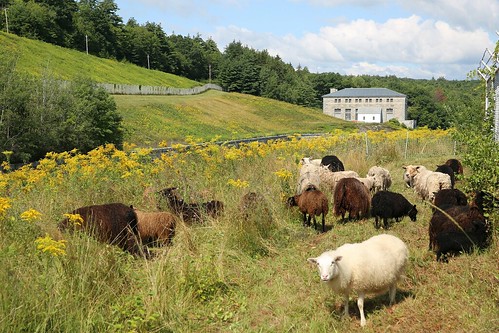FOR IMMEDIATE RELEASE 17-74 Pilot Program for Rotational Grazing with Sheep Moves to Rondout Reservoir and Merriman DamSheep are part of a rotational-grazing pilot program that began last year at Neversink DamA herd of 28 sheep last week began gobbling grass alongside Merriman Dam in Ulster County as part of a pilot program to maintain some New York City water supply properties through rotational grazing instead of mechanical mowing. The sheep were moved to the dam at Rondout Reservoir after they finished grazing a 50-acre field downstream of Neversink Dam in Sullivan County. The sheep will be used to maintain tall grass along fence lines and other hard-to-reach areas near the dam and its spillway. The pilot program—which is consistent with the City’s goals to reduce greenhouse gas emissions and cut its use of fossil fuels—began last year and will continue through October. The sheep are owned by Travis O’Dell, a farmer in Long Eddy, N.Y. DEP manages New York City’s water supply, providing more than 1 billion gallons of high-quality water each day to more than 9.5 million New Yorkers. This includes more than 70 upstate communities and institutions in Ulster, Orange, Putnam and Westchester counties who consume an average of 110 million total gallons of drinking water daily from New York City’s water supply system. This water comes from the Catskill, Delaware, and Croton watersheds that extend more than 125 miles from the City, and the system comprises 19 reservoirs, three controlled lakes, and numerous tunnels and aqueducts. DEP has nearly 6,000 employees, including almost 1,000 scientists, engineers, surveyors, watershed maintainers and other professionals in the watershed. In addition to its $70 million payroll and $166 million in annual taxes paid in upstate counties, DEP has invested more than $1.7 billion in watershed protection programs—including partnership organizations such as the Catskill Watershed Corporation and the Watershed Agricultural Council—that support sustainable farming practices, environmentally sensitive economic development, and local economic opportunity. In addition, DEP has a robust capital program with $20.7 billion in investments planned over the next 10 years that will create up to 3,000 construction-related jobs per year. For more information, visit nyc.gov/dep, like us on Facebook, or follow us on Twitter. | ||
